The Association for the Advancement of Baltic Studies is pleased share stories and experiences from its 2022 student travel grant recipients who attended the 28th Biennial Conference on Baltic Studies (May 26–29, 2022, Seattle, Washington).
Applications for AABS 2022 student travel grants were evaluated by the AABS Student Travel Grants Committee consisting of AABS Student Representative Kristo Nurmis, AABS Executive Officer-at-Large Guntis Šmidchens, and AABS Advisor to the Board Joseph Ellis. The grants were awarded to 40+ students and early career scholars to support their travel to Seattle in order to attend AABS 2022.
Mallory Needleman
Paper title: “Lithuanian Diaspora as Agents of Change: A case study of CIA officer Anthony Vaivada (1911–2001)”
In May 2022, AABS’s Travel Grant afforded me the opportunity to share my research on Anthony Vaivada (1911–2001), a Lithuanian-American who capitalized on his diaspora status to become a vocal activist for Lithuania in the private and government sectors. In the 1920s and 1930s he worked for a Lithuanian newspaper and contributed his research and voice to radio broadcasting. He also aided in Lithuania’s contributions to the 1933 World’s Fair in Chicago, and was a prominent force behind Lituanica and Lituanica II, earning the moniker as the flights’ “Godfather.” His passionate, lifelong biculturalism and popularity among Lithuanian politicians, diplomats, and fellow activists steered his World War II enlistment towards the U.S. Army’s counterintelligence unit. This allotted him the rare chance one summer’s day in 1945 in Würzburg, Germany to find himself staring at the men of Lithuania’s underground government—the Supreme Committee for the Liberation of Lithuania (VLIK). Aware of their importance to Lithuanians abroad and at home, Vaivada signaled as much to ranking officers in the Army and the OSS, the CIA predecessor. All realized their potential as allies against the Soviets. Such acumen opened for him a seat at the CIA’s Lithuania desk of the Soviet Branch, an epicenter of the early Cold War. Indeed, Anthony Vaivada’s life is a study on the ways in which the diaspora has, and can, create currents of change for their country while abroad.
Working on this study during COVID was no easy task; the archives needed were closed and FOIA requests for CIA and Army records were stalled if not halted completely. I had the luxury, however, of interviewing Anthony’s surviving children, daughters Milda and Vivian, who shared with me mementos and memories of their father. It is because of them that I could complete my research on their father, and it is because of AABS that I was able to share my research with other Baltic specialists. In fact, my placement on the Baltic Diaspora panel, chaired by Egidijus Balandis, could not have been more perfect. With Ilona Strumickienė’s presentation on “Diaspora as a Homeland-changing Agent: The Case of Lithuania” directly preceding my presentation, we were able to approach the diaspora on both a macro and micro level, interweaving points that speak to both the broad and specific.
Attending the conference as a participant as well as a speaker was a great joy, as well. The receptions (and delicious meals) allowed us to meet with colleagues away from Zoom, sometimes for the very first time. The plenaries that were cross-cultural, such as the opening plenary featuring Baltic and indigenous, as well those on contemporary news affecting the Baltics, such as that on the Russian invasion in Ukraine, were particularly insightful. The AABS member meeting was just as valuable, as we learned of upcoming conferences and were able to congratulate colleagues on their award-winning monographs and articles. In the end, I am so thrilled to be a member of AABS and look forward to participating in many more conferences in the future. I hope to see all of my friends in colleagues in Kaunas in 2023 for CBSE and (if I recall correctly) in New Haven in 2024 for AABS!
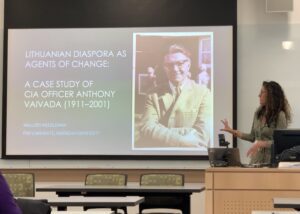
Mallory Needleman presenting her research at AABS 2022 in Seattle
Mallory Needleman is a third-year PhD candidate of History at American University in Washington, DC. Her dissertation, tentatively titled “Interpreting the Cold War through a Lithuanian Hot Zone,” defines the history of Lithuania’s long-sought independence as a prism through which to better understand the American–Soviet power competition of the twentieth century.
Olevs Nikers
Paper title: “Transatlantic Response to Chinese Inroads in the Nordic-Baltic Region”
Thanks to this travel grant, generously provided by AABS, it was possible for me to attend AABS 28th Conference on Baltic Studies “Baltic Studies at a Crossroads” in Seattle. I would like to thank all sponsors and stakeholders of this program.
The workshop “TRANSATLANTIC RESPONSE TO CHINESE INROADS IN THE NORDIC-BALTIC REGION”, which was prepared together with my colleague Mr. Otto Tabuns is a part of the Baltic Security Foundation (BSF) and the Jamestown Foundation study. For this occasion we developed a situational game for the participants of this AABS workshop in Seattle, which is also possible to exercise on any other occasions for the students of the Baltic region and international politics. It was our pleasure to meet some of the participants of the conference and discuss these issues with them.
This study will result in publication by the Jamestown Foundation, compiling articles of the experts across the Baltic Sea region, and also will include perspectives from participants of the AABS conference in Seattle.
Overall the program of the conference was very exciting and rewarding, bringing diverse perspectives on the issues of Baltic politics, history and culture.
During the conference we donated several copies of our book “Baltic Sea Security – Regional and Sectoral Perspectives” to the University of Washington Library.
I will be looking forward to the next AABS conference in Europe. Thanks once again for this brilliant opportunity.
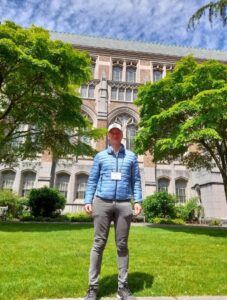
Olevs Nikers at AABS 2022 in Seattle
Olevs Nikers is PhD candidate at the Riga Stradiņš University, President of the Baltic Security Foundation, Senior Analyst at The Jamestown Foundation and associate researcher at the Latvian Institute of Foreign Affairs. Olevs has led the Baltic Security Strategy Project (2017 – 2019) supported by the Baltic-American Freedom Foundation and The Jamestown Foundation, and the Baltic Sea Security Initiative (2019 – 2021). Olevs studies regional security politics, public administration and bureaucratic politics, transatlantic security policy, and the defense and security policy of the Baltic and Baltic Sea region.
Jānis Tomaševskis
Paper title: “Social Portrait of the Latvian Armed Anti-Soviet Resistance of 1941”
I’ve been to a Baltic Studies conference once that took place in Gdansk (Poland) in 2019. It was great experience for me in many ways since I was just aiming to start my PhD studies at the University of Latvia. But the experience at the AABS 2022 was different and excellent in many more ways since it was my very first visiting the United States of America and my first AABS conference outside of Europe. I’m now aiming to end my PhD studies this Autumn and “travel” to yet unknown “land” of writing my PhD thesis. AABS 2022 in Seattle helped me to expand my horizon in many ways, and to feel a little more confident of my research direction and aims of my paper.
I was truly happy to present the results of my research of a Social Portrait of the Latvian Armed Anti-Soviet Resistance of 1941. The aim of the paper was to summarize the data obtained from the survey made by the Latvian Statistic Board in the beginning of 1942 in German occupied Latvia. There were more than 3 700 former members of armed resistance that filled the survey and which became the base of my research data. Survey contains data person’s social origins, civil and military education, activities within the resistance etc. that helped to draw a social portrait and understand choices made by Latvian people during the dramatic events of the summer of 1941.
It was my pleasure to present the data to an attentive and responsive public which attended the panel. I was also happy of the interest and questions that followed in the Q&A section and which made me think of various points of view how the topic and data could be elaborated and integrated into my research. The experience was very worthwhile and definitely would make a positive impact to my further research.
Nevertheless, an opportunity to see and hear other participants of the conference was even more refreshing and useful. Although, there were only couple of topics that crossed my theme of research, there were plenty of papers which were useful from the methodic, problem-solving and source criticism point of view. Several papers (Harry Merritt, Igor Kopotin, Kārlis Dambītis, to name a few) made a very positive impact on thinking of my research topic, finding and solving some research problems. I was also truly grateful of several fruitful conversations with other colleagues during coffee and lunch breaks that also positively shook ways how to look on my research topic and science overall.
The AABS student travel grant gave an opportunity to see the New World for the first time and in some way opened a “new world” for me personally. I was excited to visit the great University of Washington, see how the things are set there, and also to see the beautiful and green city of Seattle. Architecture, streets, parks, monuments, museums, mountains etc. made a lasting impression on me. I’m also a huge fan of classic rock music and grunge, so the Museum of Pop Music, sculpture of Jimi Hendrix etc. was like a dream come true.
To sum up, such a unique and absolutely amazing experience to me would not be possible without the AABS student travel grant and I’m very grateful to AABS board, members and conference donors which provided their knowledge and funds that made it possible. I would definitely name AABS as the greatest organization and the AABS 2022 conference the best I have been so far. It was the best possible experience I could get. Many thanks!
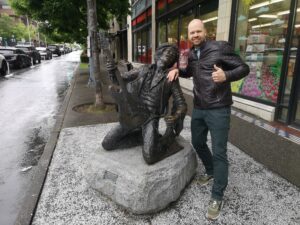
Jānis Tomaševskis
Jānis Tomaševskis a PhD student of history at the University of Latvia and a historian at the War Museum of Latvia. He is the author of the monograph “Whispers of Independence: History of the Latvian Provisional National Council” (2017) (in Latvian). He is also an author of 12 academic publications and 15 popular publications, as well as a participant of more than 15 scientific conferences. His research interests entail the activities of national partisan/selfdefense units at the beginning of the German-USSR war in summer 1941, Latvian armed units within the Nazi and Soviet military forces during the WWII, and the attitude of Latvian society towards totalitarian powers.
Anna Branets
Paper title: “Communication in mediated Receptive Multilingualism: An experimental study of how Estonians interact with Ukrainians“
I was delighted to participate in the AABS conference “Baltic Studies at a Crossroads” (May 27–29, 2022) in Seattle (WA) in person. This was my second AABS conference and my first in-person conference this year. The AABS 2022 student travel grant made it possible to attend the conference, present my study, reconnect with the AABS colleagues and friends, and establish new connections.
I was very eager to present my research “Communication in mediated Receptive Multilingualism: An experimental study of how Estonians interact with Ukrainians” at the AABS conference. This study describes how Ukrainians who recently arrived in Estonia use different multilingual practices specifically how they employ different language modes to make communication happen. For example, a Ukrainian person has different choices of communicating with people in Estonia. She/he can use English while talking to Estonians if she/he has proficiency in English. Another way is to communicate in Russian, as both Estonians and Ukrainians have considerable L2 experience from the Soviet time. However, not everyone speaks Russian well enough to get by in Estonia. In this case, it is also possible to employ Ukrainian while communicating with Estonians and reach an understanding via passive knowledge of Russian. Estonians are sympathetic towards Ukraine, and this may be a factor facilitating communication. A mode of communication in which interlocutors use their own language while speaking to each other is called Receptive Multilingualism, RM (Rehbein, ten Thije & Verschik 2011). This particular type of communication between Estonians and Ukrainians via Russian belongs to the mediated type of RM. Interlocutors can negotiate the meaning and use codeswitching when it is necessary in order to achieve understanding.
Being a Ukrainian requires a visa for entering the US. Because of the travel restrictions due to the pandemic, the US embassy was giving a limited number of appointments. I did not know until the last moment if I would be able to join the conference in person. Eventually, I received an appointment and was granted a visa on May 20(!) and I was able to still join the conference. Quite an adventure! I would like to emphasize the enormous amount of support that I received from Liisi Esse and Laura A. Dean who were keeping my presentation in the programme until the last moment provided me with the invitation letter and relevant information for the embassy and were very flexible with the travel grant payment. I do not think it would be possible for me to join the conference without their support and understanding.
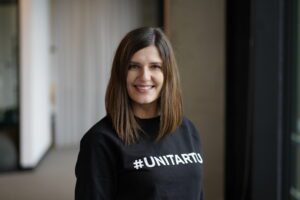
Anna Branets
Anna Branets is a third-year Ph.D. student at the University of Tartu (Estonia). Her research interests comprise such topics as sociolinguistics, multilingualism and namely receptive multilingualism, comprehension between languages, L3 language acquisition. She focuses on Ukrainian, Russian and Estonian cases.
Helena Eglit
Paper title: “Western Concepts of Eastern Europe: the OSCE Mission to Estonia as an example of Orientalism”
The AABS conference “Baltics Studies at a Crossroads” at the University of Washington was one of the highlights of my life. The travel grant offered me a chance to make a presentation for the very first time on the international stage. During my time there, I gained a lot of confidence. These three days in Seattle gave me the courage to test my limits in the future. I also met new people and heard about the latest research topics in Baltic studies. The conference organizers were always kind and helpful, and the atmosphere there friendly and fun! I am already looking forward to the next conference to see the people and listen intriguing panel discussions.

Helena Eglit
Helena Eglit is a third-year student at the University of Tartu, focusing mainly on international relations, philosophy, nationalism, and gender studies.
Monika Kareniauskaite
Paper title: “From the Conflicts of Memory to Reconciliation Strategies: National, Regional and European dimensions. The case of Baltic Countries”
I was very happy to get the opportunity to be awarded the AABS travel grant and to participate in the conference. After two pandemic years, meeting the other scholars and colleagues, hearing their live presentations and participating in in-person discussions was more than enjoyable. From the very first conference day – the discussion on the intersection between the Baltic and Indigenous communities’ studies fields – I was amazed by the unexpected, yet, very accurate academic ideas and insights, expressed in the beautiful venues of the campus of the University of Washington.
The conference was indeed intellectually very stimulating. I was surprised, how many talented scholars from the USA, Baltics and other places in the world the organizers brought together. It felt, that the Baltic studies community was renewed and strengthened. It made me realize the potential of the Baltic studies field – despite being a rather narrow research and teaching area in the global academy.
I realized, that being small does not mean being insignificant. The academic cooperation, discussions and insights of the AABS 2022 Seattle participants made me reflect on how much value the Baltic intellectual thought can create for the global academic scene and beyond, in such fields as art, music, literature, politics, history, area and comparative studies, even STEM and innovations. Perhaps, the most important story that the people of the Baltics are narrating to the world today – is the story of resilience.
We know, that Baltic identity is a complex and complicated topic from the standpoint of history. We also know, that, in the face of the global crisis – whether economic or political; related to the environment or peace – the Baltic historical resistance against the dark manifestations of toxic ideologies and technologies (both, coming from the outside and these within our own communities) is indeed the story, that the world finally wants to hear. And the intellectual potential of the Baltic Scholars community provides the Voice and the Power of the Small.
So, to me the AABS 2022 Seattle was, first of all, an inspiring intellectual adventure together with like-minded, trustworthy friends – the Baltic Studies Community. I also truly enjoyed having the opportunity to express my own insights by giving the presentation, chairing two sessions (on digital humanities and 20th Century Baltic history), and, before the conference – working as a division co-chair. This experience is valuable for the professional and personal growth.
Last, but not the least – I found it very valuable to connect with the others on a personal level. For instance, at the Seattle conference I made connections with wonderful members of the Boston Lithuanian community. We are already developing projects and organizing events together. Therefore, the community-building process, that was triggered by the AABS 2022, continues.
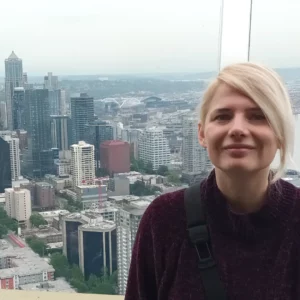
Monika Kareniauskaite
Monika Kareniauskaite, PhD, specializes in Soviet and post-Soviet history, law, gender and criminality. Her research and interests cover criminal prosecution systems in Soviet and post-Soviet Lithuania and the USSR, anti-Soviet resistance, Soviet political trials and deportations, the dissident movement, the culture of remembrance in the former Eastern Bloc, and techniques of digital humanities. She works at the Lithuanian Institute of History and is visiting scholar at the Harvard University.
